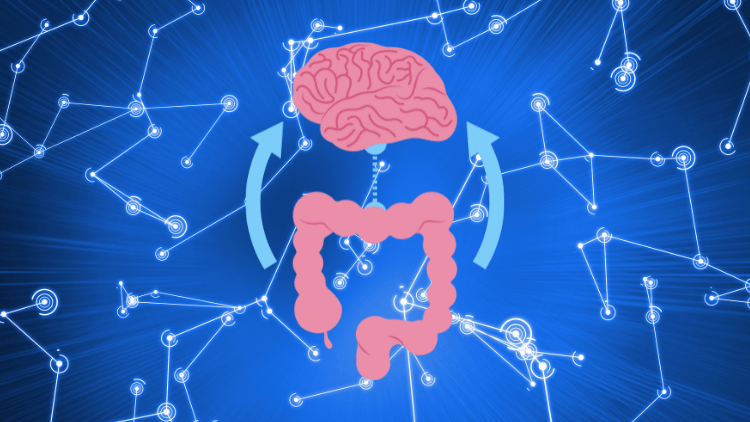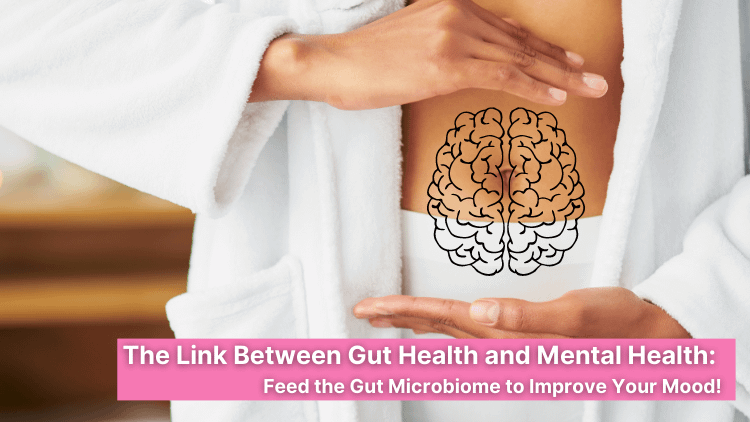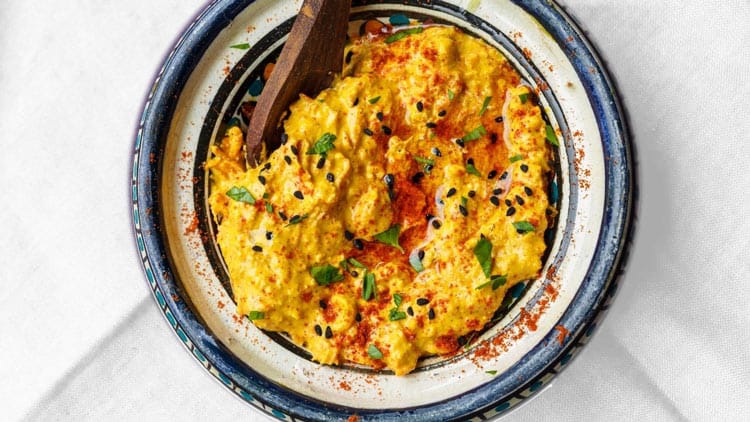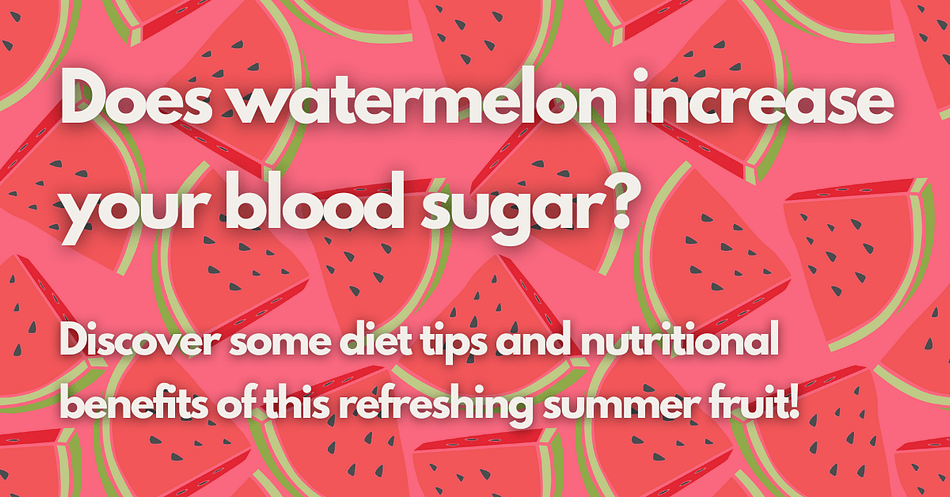Share This


Pages on this site may contain affiliate links, meaning if you book or buy something, I may earn an affiliate commission at no additional cost to you. Thank you for your support! Learn More
Also note: While I am a certified nutrition coach, I am not a medical doctor. Information here is not intended to be a replacement for the advice you should seek from your doctor.
If you’re anything like me, you’ve probably experienced times in life when stress, anxiety, or low moods seemed to linger a little too long. Although in the years I have tried several remedies -some more natural than others- I have never delved deeper into the fascinating connection between gut health and mental health until a couple of months ago.
This is when I opened the “Pandora’s Box” of the gut-brain connection for the first time and uncovered a whole new world that was previously completely oblivious to me. Believe it or not, there’s an incredible relationship between what’s going on in our bellies and how we feel in our minds.
When I started to notice how my digestive issues seemed to coincide with times of stress and emotional turbulence, I decided that it was time to take control of my gut health. In this article, we will explore the magical connection between our guts and brains, as well as nutrition tips and the best supplements to nurture our gut microbiome.
Please remember to consult with a registered dietitian or nutritionist to obtain personalized recommendations, especially if you have any health concerns or need more specific nutritional advice.
Gut Health and Mental Health: What is the Gut-Brain Axis?


Gut health and mental health are intricately linked through the gut-brain axis, a bidirectional communication system between the gut and the brain. More specifically, it connects the central nervous system (CNS), which includes the brain and spinal cord, with the enteric nervous system (ENS), sometimes referred to as the “second brain,” residing in the gastrointestinal (GI) tract.
In turn, this intricate connection is mediated by the vast community of microorganisms residing in the gut -also known as the gut microbiome. The gut microbiome is composed of trillions of bacteria, viruses, fungi, and other microorganisms that coexist symbiotically with our bodies. This ecosystem of microorganisms plays a vital role in maintaining various aspects of human health, including digestive function, nutrient absorption, immune system regulation, and even the synthesis of essential vitamins and neurotransmitters.
Gut Health and Mental Health: a Two-Way Connection
As hinted previously, gut health and mental health are strictly linked in multiple, intricate ways. Let’s see how the two influence each other.
How the Gut Microbiome Influences Mental Health
One of the most significant ways the gut microbiome influences mental health is through the production and modulation of neurotransmitters. Neurotransmitters are chemical messengers that facilitate communication between nerve cells in the brain. As such, they play a crucial role in regulating mood, emotions, and cognitive function. Interestingly, many of these neurotransmitters live in the gut, and the gut microbiome has the capacity to produce some of them.
For example, serotonin, often referred to as the “happy hormone,” is a neurotransmitter that contributes to feelings of well-being and happiness. Approximately 90% of the body’s serotonin is produced in the gut, where specific gut bacteria participate in its synthesis. The balance of these gut bacteria can, therefore, influence serotonin levels and potentially impact mood and emotional health.
Additionally, the gut microbiome also influences the immune system and systemic inflammation, which are closely related to mental health. An imbalance in the gut microbiome, known as dysbiosis, can lead to increased inflammation in the body. Inflammation can, in turn, cause various mental health disorders such as depression and anxiety.
On a last note, the gut microbiome also communicates with the brain through the vagus nerve, a long nerve connecting the brainstem to various organs, including the gut. This communication may influence various brain functions, including cognition, memory, and emotional regulation.
❤️❤️ Don’t miss a recipe or post! Make sure you remember to sign up for my Newsletter and follow me on social ❤️❤️!
Get Your Free Stuff!
How Mental Health Influences the Gut
Conversely, mental health issues, especially chronic stress and certain mood disorders can influence the gut microbiome. Chronic stress might increase the abundance of harmful bacteria in the gut, while reducing the number of beneficial ones, leading to dysbiosis.
Moreover, mental health issues -and in particular high levels of stress and anxiety- have been associated with increased intestinal permeability, often referred to as “leaky gut.” When the gut barrier is compromised, it may allow undigested food particles, toxins, and bacteria to enter the bloodstream, triggering an immune response and inflammation. This can lead to gastrointestinal issues and potentially contribute to systemic inflammation. In turn, as explained above, this can lead to various mental health disorders.
Last but not least, particularly intense emotional states can affect gut motility and function. In particular, it can lead to changes in gut motility, causing symptoms like abdominal discomfort, diarrhea, or constipation. Additionally, the gut’s response to stress can influence nutrient absorption and digestion, further impacting overall gut health.
Overall, research in this area is still relatively new, and the full extent of the gut-brain axis’s impact on mental health is yet to be fully understood. Nonetheless, it is becoming increasingly evident that a healthy gut, supported by a diverse and balanced gut microbiome, is essential for overall well-being, including mental health.
Here is how you can start taking care of your gut microbiome by simply making some small adjustments to your daily diet and lifestyle habits!
The Best Foods to Nurture Your Gut Microbiome: Probiotics and Prebiotics
Nurturing your gut microbiome is essential for having a fast and strong digestive system and supporting your emotional health. Prebiotics and probiotics are two categories of foods that play a pivotal role in promoting a diverse and balanced gut microbiome.


Even though the two are often confused, they each play a distinct role in regard to gut health, and they are found in different food categories. Let’s tackle each of them.
Prebiotic Foods
Prebiotics are non-digestible fibers that serve as food for beneficial gut bacteria, promoting their growth and activity. Hence why including prebiotic-rich foods in your diet can support overall digestive health and reduce bloating.
Some excellent sources of prebiotics include:
Garlic
Garlic contains inulin, a potent prebiotic fiber that supports the growth of beneficial bacteria in the gut.
Onions
Onions are rich in fructooligosaccharides (FOS), another prebiotic fiber that feeds beneficial gut bacteria.
Asparagus
Asparagus contains inulin and FOS, making it a great prebiotic food.
Bananas
Ripe bananas are a good source of resistant starch, which acts as a prebiotic in the gut.
Chicory Root
Lastly, chicory root is high in inulin and is commonly used in prebiotic supplements. In addition, it can also be used to create a delicious hot beverage alternative to coffee.
Probiotic Foods
On the other hand, probiotics are live beneficial bacteria that, when consumed, can colonize the gut and contribute to a healthy gut microbiome. They can be found in certain fermented foods and dairy products. The main advice is to look for products that contain live and active cultures.
Some top probiotic-rich foods include:
Yogurt
Choose plain, unsweetened yogurt with live and active cultures to ensure good probiotic content.
Kefir
Kefir is a fermented milk drink containing various probiotic strains beneficial for gut health.
Sauerkraut
Fermented cabbage, or sauerkraut, is one of the greatest sources of probiotics. It is incredibly versatile and, by adding just a couple of tablespoons to your meal, you can ensure a happier and healthier gut!
Kimchi
Kimchi is a traditional Korean side dish made from fermented vegetables. Again, one of the greatest and more versatile sources of probiotics.
Tempeh
A product obtained from the fermentation of soybeans, that contributes to the diversity and balance of the gut microbiome.
In summary, the main difference between prebiotics and probiotics is that the former consist of indigestible fibers that nourish the beneficial bacteria already residing in the gut, while the latter are live microorganisms that are introduced into the gut to directly influence its microbial balance.
The most important thing is to consume a wide variety of foods from both categories. In this way, you can nurture the variety of microorganisms in your gut and create an optimal environment for their survival. In turn, this will concretely help support your mental health through the gut-brain axis mentioned above.
Additionally, you might consider taking probiotics and other supplements to increase the number of beneficial bacteria living in your gut. Here are the best supplements for supporting your gut and mental health.
Best Supplements for Supporting your Gut and Mental Health
When considering supplements to support gut and mental health, it’s essential to focus on those that target both aspects of the gut-brain axis. Among the best supplements that I have found incredibly effective in promoting a healthy gut microbiome and potentially supporting mental well-being:
1. Probiotics
As explained above, probiotic supplements provide live beneficial bacteria that can help maintain a balanced gut microbiome. Look for products with a diverse range of probiotic strains, including Lactobacillus and Bifidobacterium species. I love these probiotics from the brand Garden of Life. They also contain a blend of organic Ashwagandha and Blueberries extract specifically formulated to help with stress management.
2. Prebiotics
Prebiotic supplements contain non-digestible fibers that serve as food for beneficial gut bacteria, such as inulin, fructooligosaccharides (FOS), or resistant starch. A great prebiotic supplement is this inulin powder from Garden of Life. Alternatively, you can take a supplement that contains both prebiotics and probiotics, such as this one from Swanson.
3. Omega-3 Fatty Acids
Omega-3 fatty acids, particularly EPA (eicosapentaenoic acid) and DHA (docosahexaenoic acid), are essential for brain health and can have anti-inflammatory effects. Supplements containing Omega-3 can be sourced from both fish oil and algae. I personally opt for algae-based Omega-3 supplements, as I find them easier to digest and consume.
4. Magnesium
Magnesium is an essential mineral that plays a role in various bodily functions, including muscle relaxation and neurotransmitter regulation. It can help with stress management and promote better sleep, indirectly influencing both mental and gut health.
5. Ashwagandha
Ashwagandha is an adaptogenic plant popular for its stress-reducing and mood-boosting properties. In turn, as explained before, our ability to manage stress might directly benefit the overall health of our gut.
6. Rhodiola
Similarly to Ashwagandha, Rhodiola is another adaptogenic herb that has been studied for its potential to reduce stress and fatigue. Again, releasing stress and anxiety can contribute to a healthier gut environment.
Disclaimer! Before starting any supplements, it’s essential to consult with a healthcare professional, such as a doctor or registered dietitian, to determine the right dosages and to ensure that the supplements are appropriate for your individual needs and health status.
5 Tips to Take Care of Your Gut and Mental Health
Finally, 5 easy-to-implement tips that have helped me take care of both my gut and mental health.


1. Reduce Processed Foods ❌🍟
Limit your intake of processed and sugary foods, as they can negatively impact gut health and contribute to mood swings.
2. Learn How to Manage Stress 🧘🏽♀️
Engage in stress-reduction practices like meditation, deep breathing, yoga, or spending time in nature. Chronic stress can disrupt the gut-brain axis, affecting both gut and mental health.
3. Prioritize Sleep 🛌🏼
Aim for 7-9 hours of quality sleep per night. Sufficient sleep supports gut repair and helps regulate mood and emotions.
4. Excercise Regularly 🏃🏽♀️
Regular physical activity not only benefits your body but also supports gut health and can positively influence mood and mental well-being through the release of dopamine and serotonin.
5. Seek Social Connections 👯♀️
Cultivate meaningful relationships and engage in social activities. Social support can greatly improve mental health, which in turn can positively impact gut health.
If you have found this article insightful, don’t hesitate to share it with your family and friends! And let’s connect over to my socials, all the links are below.💗
Please remember to consult with a registered dietitian or nutritionist to obtain personalized recommendations, especially if you have any health concerns or you need more specific nutritional advice.












